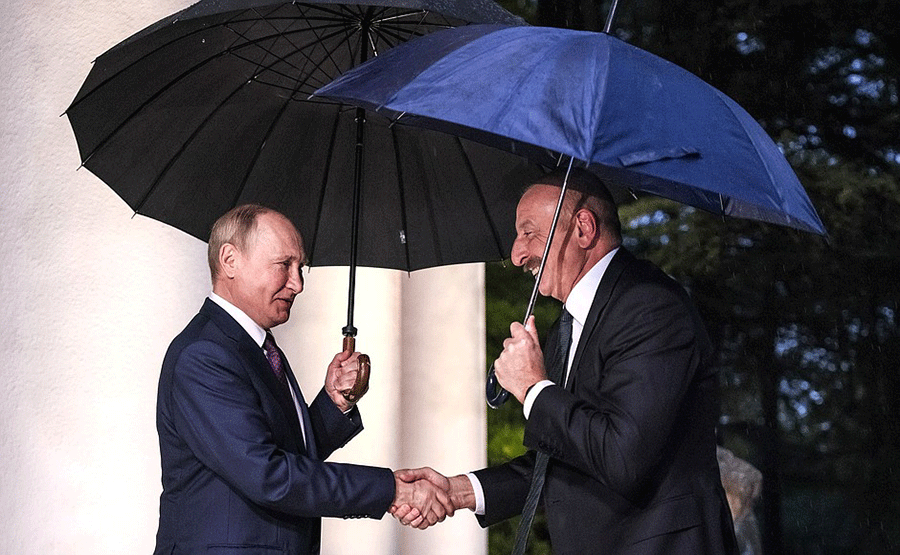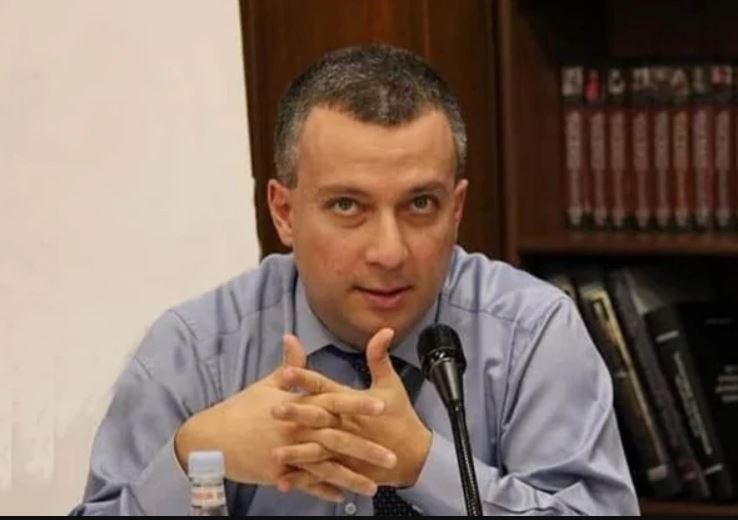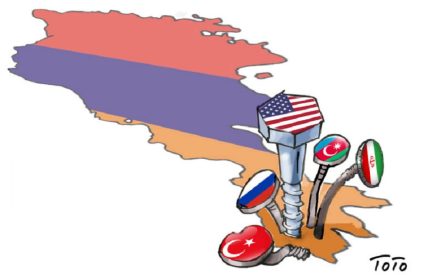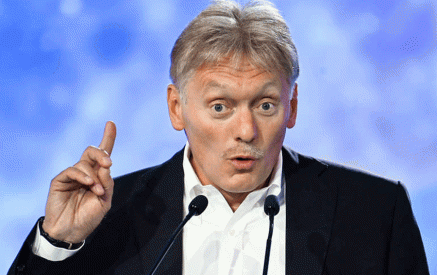NARRATIVES OF THE NEW ROUND OF “NIETHER PEACE, NOR WAR” IN ARMENIAN AND AZERBAIJANI MEDIA AND SOCIAL MEDIA PLATFORMS
(December 2022 – May 2023)
Read also
PART 6. MEDIATORS AND OTHER EXTERNAL ACTORS
Summary
Laura Baghdasaryan, Director of “Region” Research Center (Armenia),
Arif Yunusov, Head of the Department of Conflict and Migration Studies of the Institute for Peace and Democracy (Azerbaijan)
The role of mediators in the Armenian-Azerbaijani settlement, as well as other actors involved was a significant topic in the Armenian and Azerbaijani public discourse both before and after the second Karabakh war in 2020. Following the losses suffered in the 2020 war, the Armenian side’s primary criterion for gauging the perception of specific external actors was, first of all, their stance towards the security concerns of Armenia and the Armenian population of Nagorno Karabakh.
Prior to this, the Armenian public’s perception of the world was shaped by diverse perspectives regarding countries and organizations, which were viewed as partners in specific areas. For instance, Russia was primarily perceived as Armenia’s security ally, the European countries and structures were viewed as economic and human rights partners. Even the economic cooperation with Turkey, which constantly expressed its solidarity with Azerbaijan against Armenia, was deemed quite acceptable for a significant portion of Armenian society.
Russia, of course, continued to occupy a central position in the public discourse of both Armenia and Azerbaijan. In the Armenian context, Russia’s passive conduct during the studied period garnered critical assessments not only from socio-political groups with pronounced pro-Western leanings, but also from opposition forces, which until recently attributed such behavior by Russia to the RA government’s “anti-Russian or inept policy”.
In May 2023, the results of a sociological survey conducted by the International Republican Institute (IRI) between January and March were made public. The survey revealed the viewpoints of the population of Armenia, which considers Iran (54% of respondents), France (52%), Russia (50%), the USA (37%), and the EU (22%) to be the most important partners of Armenia in terms of security. Interestingly, among respondents who held a positive view of the relationship between Russia and Armenia the majority (40% out of 50%) believed that these relations were only moderately good. These figures represented the lowest rating for Russia in the history of Russian-Armenian relations, as previous opinion polls, constantly and by a large margin ranked Russia as the top country in terms of importance for Armenia’s security.
What can be expected from Russia in the context of the Armenian-Azerbaijani post-war confrontation? This question, even if not explicitly voiced, constantly lingered in the Armenian media’s coverage of a number of issues and security threats faced by Armenia and NK that emerged following the 2020 war. These included issues like the blockade of the population of NK, the ongoing negotiations on the peace treaty between Armenia and Azerbaijan, the possibility of Azerbaijan launching a new war against Armenia or the “anti-terrorist operation” in NK itself declared by the Azerbaijani side, as well as the issue of demarcation and delimitation of the Armenian-Azerbaijani borders.
The Azerbaijani public holds quite widespread anti-Russian sentiments, which stem from the belief that Russia has not acted in a favorable manner towards Azerbaijan’s interests in the past.
Due to a series of incidents, the presence of Russian troops in Armenia and in NK itself is no longer perceived as a reliable security shield by the Armenian side. It sometimes seemed that the Russian Foreign Ministry was unaware of the bulletins of the Russian peacekeeping contingent in Nagorno Karabakh, which documented daily ceasefire violations in their designated area, identifying the Azerbaijani side as the party initiating these escalations. For example, on the occasion of the killing of 3 Karabakh policemen on March 5, 2023, the Russian Foreign Ministry stated that Yerevan’s engagement in the search for solutions would contribute to the reduction of tension. However, the bulletin of the RPC regarding the same incident stated: “On March 5, 2023, at 10:00 in the vicinity of the settlement of Dyukyanlar, servicemen of the armed forces of the Republic of Azerbaijan opened fire on a car carrying Nagorno Karabakh law enforcement officers. As a result of the clash, three people were killed and one officer who was in the car was injured. On the Azerbaijani side, there were two deaths and one injury. Thanks to the efforts of Russian peacekeepers, the clash was brought to an end.” The ruling regime of the AR acknowledges the military presence of Russia in the conflict zone and is making efforts to avoid any military or political issues with Russia.
Russia effectively sidesteps military-political complications with Azerbaijan thanks to its inert stance in meeting its contractual obligations towards Armenia. And Azerbaijan’s desire to avoid problems with Russia is not demonstrated through a de-escalation policy against Armenia, but rather through a form of flirtation between the AR Armed Forces and the RF peacekeeping contingent. For example, throughout this whole period Russian forces would appear in certain areas after the escalations had already taken place. Additionally, Azerbaijan and Russia also share interests in preventing the expansion of the role of Western countries and international organizations in the Armenian-Azerbaijani settlement.
The perception of the EU and the US within Armenian society can be characterized as moderately positive. At the same time, there is an understanding that no matter how much the EU countries and European international organizations condemn Azerbaijan’s policies towards the residents of NK and various forms of pressure on Armenia, these condemnations merely remain at the level of rhetoric, while resolving issues such as the blockade of NK necessitates more effective measures. It is unlikely that Azerbaijan will face sanctions due to its involvement in assisting the European countries in overcoming their gas dependency on Russia. And from this perspective, the positive assessments of France’s actions in advancing Armenian interests in the international arena were overshadowed in terms of emotionality by the negative assessments of France expressed by the Azerbaijani side, including from official circles of Azerbaijan.
Turkey continued to be perceived by the Armenian and Azerbaijani sides with contrasting perspectives. For Azerbaijan, it is a brotherly country, ready to provide support in any endeavor. Despite the short-term optimism associated with the humanitarian aid sent by Armenia to Turkey during the earthquake and a number of positive statements in this regard, the persistent hostile attitude towards Turkey is fueled by the regular reports about joint Azerbaijani-Turkish military drills near the Armenian border and the statements made by Turkish leaders.
Despite the strained diplomatic relations between Azerbaijan and Iran (for the first time diplomats were expelled from both sides), the Armenian side also displayed a measured response to the Iranian policy regarding the Armenian-Azerbaijani post-war confrontation. The Armenian perspective refrained from formulating far-reaching plans based solely on this diplomatic escalation. However, certain Armenian speakers repeatedly highlighted that in the context of border issues Armenia’s interests coincided more with Iran than with Russia.
Over the past six months, the impact of the Russian-Ukrainian war on the Armenian-Azerbaijani dynamics has become more apparent due to the already undisguised competition among the mediators. The Karabakh conflict has ceased to be that exclusive platform where their cooperation was possible. However, the very course of the Russian-Ukrainian war and the intensifying rivalry between Russia and the West have prompted even Azerbaijani pro-government politicians and experts to advocate for the need of a more flexible foreign policy that is not solely pro-Russian. There have been extensive discussions about the need to diversify its former security system on the Armenian platforms as well. And these parallels reflect the most tangible impact of the Russian-Ukrainian war on recent Armenian-Azerbaijani relations.
This research has been organized within the framework of the Region Research Center’s project “New Agendas for Peace and Stability in the South Caucasus after the Karabakh 2020 War”. The project is being implemented by the support of the Black Sea Trust for Regional Cooperation. The opinions expressed in this material are those of the authors and do not necessarily represent the opinions and positions of the Black Sea Trust for Regional Cooperation or its partners.

























































